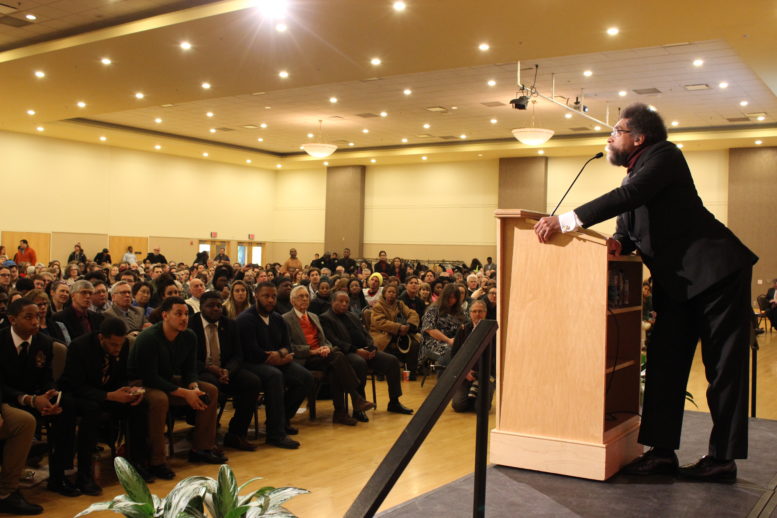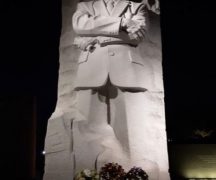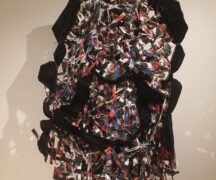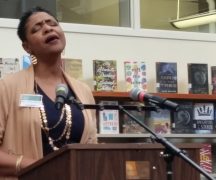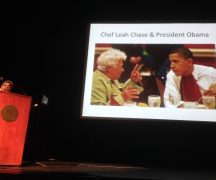By DAVID DUPONT
BG Independent News
Martin Luther King Jr. is no Santa Claus.
Cornel West, an activist and philosopher, told his audience at Bowling Green State University Thursday night, to resist efforts “to defang him,” to make King some lovable figure, a benign old man with a bag of toys on his back. “Don’t Santa-Clausify, my brother,” West said.
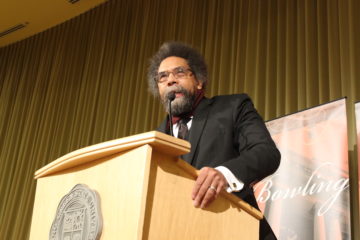 “In a celebrity-scented culture, so obsessed with feeling comfortable … we just want to hear something that makes us feel good. If that’s the case you got the wrong Negro with Martin Luther King Jr. He wanted you to feel empowered, challenged, so you can straighten your back up.”
“In a celebrity-scented culture, so obsessed with feeling comfortable … we just want to hear something that makes us feel good. If that’s the case you got the wrong Negro with Martin Luther King Jr. He wanted you to feel empowered, challenged, so you can straighten your back up.”
As beloved as the civil rights leader is today, he was not in his time, West said.
Right before his death, 72 percent of Americans disapproved of King, and that included 55 percent of African-Americans. FBI Director J. Edgar Hoover considered him “the most dangerous man in American.”
King was a “love warrior,” West said. “Justice is what love looks like in public.” He fought against systematic racism, and also opposed the Vietnam War and militarism. He believed “poverty was a form of tyranny.”
The indifference to humanity that led to dropping bombs in Vietnam was tied to the indifference to the poor in this country, whether they are poor blacks in the inner city, or Latinos in barrios or impoverished white in Appalachia.
“There’s a connection between militarism on one hand and the indifference to the plight of our poor brothers and sisters on the other,” he said.
That lesson has not been learned. Not when the U.S. has launched 512 drone strikes in the past year and dropped 26,171 bombs in the last year.
West, who said he was breakdancing in 2008 when Barack Obama was elected president, has called the former president to task for not reining in the military industrial complex.
The casualties – 750,000 in seven years – from those conflicts, mostly in majority Muslim nations, are what gave rise to “the gangsters and thugs” of ISIS. “They have gangsters and thugs in all traditions,” he said.
If such a death toll had been experienced in America, the Ku Klux Klan would be on the frontlines.
Africans Americans have shown another way. “We’re not a people of revenge, but a people of justice.” If blacks had chosen revenge there would be a black American version of ISIS.
Instead King believed: “You cannot separate tenderness, sweetness, kindness, and generosity from the struggles for justice. … How do you remain sweet in the face of all this viciousness?”
The music that grew from the ring shouts of enslaved people meeting in secret at night has been central to keeping this “love train” on track.
“They would produce a song, a harmony, a melody that would allow them to stay connected to their humanity that was called into question every day and every night,” he said.
West riffed on the importance of music throughout his speech, which had all the musicality of a black Baptist sermon. At the beginning, he said, that he might as well play John Coltrane’s album “A Love Supreme” then “just take a seat.” Or put on Marvin Gaye’s “What’s Going On?” and “just sit.”
“Music,” he said, “is the special leavening in the loaf.” He evoked Billie Holiday, Ella Fitzgerald, George Clinton, Mahalia Jackson, the Delfonics and others. “That’s not just entertainment. That’s about social warfare to empower people who have been down so long.”
But he’s concerned that on the eve of the inauguration of “my dear, fellow citizen Donald Trump,” all that may be endangered. He warned that progress made in the last generations could be lost “in a matter months.”
“The neo-fascist possibilities are very real.” He wonders: “Do we have what it takes?”
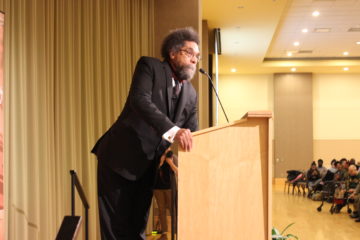 He decried a system of increased inequality where eight individuals globally control more wealth than the bottom half of the world population.
He decried a system of increased inequality where eight individuals globally control more wealth than the bottom half of the world population.
Only Bernie Sanders, whom West supported in the primaries, spoke about poverty. The GOP “was missing in action” and Democrats did little better.
He decried a system that imprisons 2.5 million predominately black and brown people, mostly for drug offenses.
He decried a culture increasingly focused on materialism, “a culture that has deified being a brand rather than fighting for a cause.”
“The heroes are those who become the biggest brand.” West called this “a form of spiritual malnutrition.”
The measure of humanity is what a person does for the poor, the downtrodden, and the imprisoned, he said.
If King came back now and saw Muslims being attacked, he say, “I am a Muslim.” If he saw gays and lesbians mistreated, he say, “I am a gay and lesbian.”
And if he saw the way “poor white folk are viewed with such condescension and unbelievable arrogance by the educated elite, as if poor white brothers and sisters were not human beings like everybody else, I hear him saying: ‘I am a poor white brother.’”
In each case, “their destiny is inextricably woven into our destiny. It’s not politics. It’s a spiritual question. What kind of human being do you want to be in your life?”
West said: “We live in the age of the sellout. Everybody and everything is for sale. … It’s hard to find examples of integrity.”
He declared “I love Beyoncé” and called her “the greatest entertainer of our time” who “has control over her body and has control of her money.”
But, he continued, “she’s still a symbol of a culture of superficial spectacle.”
He contrasted Beyoncé with Aretha Franklin.
Franklin, he said, “is not a body stimulator, but a soul stirrer.”
Later, during the hour-long question and answer session, BGSU history Professor Nicole Jackson questioned his calling out of Beyoncé, and wondered why he singled out a woman not a man, and why he criticized her use of her body on stage.
West thanked Jackson for her comments, and said he too is open to criticism. He said he included his comments on Beyoncé’s control of her body and money in response to a similar complaint.
But he reiterated his insistence that Beyoncé represents the culture of her time. He later connected that with the ingratiating stage manner of Louis Armstrong that younger musicians questioned while never denying his musical genius.
West insisted on listening to questions and statements until there were no more.
He offered advice to young activists. He listened to a plea from Danny Brown, a Toledo man who feels he still hasn’t received justice 16 years after he was released from prison after serving 20 years for a crime he did not commit. West assured him there were people present who could help him.
West was asked about President Mary Ellen Mazey’s decision not to support making BGSU a sanctuary campus. Reach out and find allies, West said.
He was asked by a Palestinian woman about his strong support on the Democratic platform committee for a two-state solution to the impasse over occupied territories. He said Israel needs to co-exist with the Palestinians, not dominate them.
He concluded by saying: “I enter the Trump Era more fortified, more ready to tell the truth than ever.”

